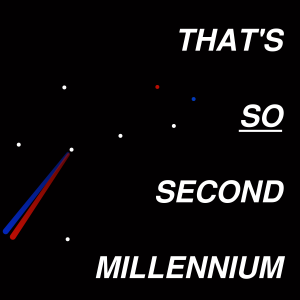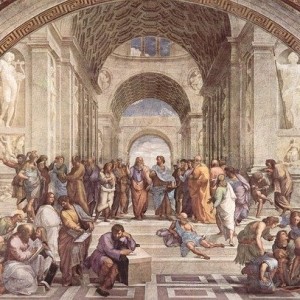Episodes

Wednesday Oct 28, 2020
Episode 112 – A Happy Medium: By What Means?
Wednesday Oct 28, 2020
Wednesday Oct 28, 2020
-
Paul and Bill focused on the 2020 elections as a point of tragically little focus in discourse or reasoning—but a good starting point for wide-ranging conversation about humanity’s desperate search for balance, hope, and sustainability in our hearts and minds. The desire for a higher wisdom—a happy medium, a golden mean—has always been complicated by our focus on ourselves and our temptation to believe that we know best, the co-hosts pointed out. Bill pointed out that “fake news” was said to have made its first appearance in the Garden of Eden, courtesy of the serpent; that comment was made by Pope Francis in his 2018 reflections for World Communications Day.
-
Society is operating in a state of radical uncertainty and unsustainable indebtedness among persons, but we forget the stabilizing recognition that we share an indebtedness to God—a responsibility to Him as our source and our only reliable resource. We have forgotten a lot about this, leaving us not only lost, but facing a steep price to pay as God’s children, Paul said. He referred to the story of King Josiah’ realization that he and his people had strayed from the laws of the Torah.
-
People seeking personal goodness and the common good know we have made serious mistakes on our journeys and have perpetuated ignorance and poor judgment. Each successive generation has been left unprepared and unable to make difficult decisions that would point toward healing. Bill recalled G. K. Chesterton’s call for a nation’s responsibility to wisdom that whatever wisdom was being handed down via what he called “the democracy of the dead.”
-
But such respect for tradition is not one of humanity’s strong points. Paul pointed out that our podcast’s name points to a second millennium whose second half was marked by major departures from tradition for the sake of greater human creativity. The co-hosts discussed how any attainment of a golden mean has been lost in the pursuit of collaborative innovation—even though we fail to hone our ideas as humble learners and listeners. Meanwhile, any instinct to hold fast to the tried and true only traps us in cocoons of misguided, comfortable assumptions. The artificial “communities” we belong to through our digital culture are places not of roots which allow us to grow, but of simplified labels which mimic understanding, Bill said. He was drawing upon concerns about internet trends voiced by Pope Francis in his 2019 message for World Communications Day.
-
Our political system does not encourage any sustained, constructive dialogue between the old and the new or between fresh, authentic perspectives. Paul pointed out that we are not presented with real choices despite the fact that parties and partisans paint themselves as sharply different. And Bill pointed out that one are of common ground so many leaders share is the use of pessimism and fear. He recalled the presidential campaigns where candidate Biden spoke of a dark winter ahead and candidate Trump portrayed himself as the alternative to anarchy and economic despair.
-
When an incomplete knowledge of history leads to despair about the past and present of a society, it can seem like the structures undergirding that society are held up more by mass psychology than real accomplishments or aspirations, the co-hosts said. Our culture likes to exalt creativity in principle, but have we made it easier to see connectivity and possibilities, Paul asks. Bill, proving his fascination with papal teachings for World Communications Day, would point out that the 2020 message of Pope Francis highlights our need to pass along hopeful stories from generation to generation that begin with our dynamic, hopeful relationships with God. Paul reflected on how our childhoods do not always prepare us for the kinds of pursuits entailed in the career pursuits and panoramic interests of adulthood. In a world of limited, utilitarian perspectives, it is hard to find happy wanderers with big ideas looking for life’s happy mediums.

Monday Oct 12, 2020
Episode 111 - A Catholic Teacher – Dear Old Golden Rule Days
Monday Oct 12, 2020
Monday Oct 12, 2020
- Brad Stalcup joins Paul and Bill in this episode to talk about his recent entry into the world of Catholic education. He began teaching religion to high school freshmen and sophomores in this fall semester of 2020—a time that Paul describes as a “baptism of fire” because of Covid-19 and today’s unusual circumstances overall.
- The vast majority of the approximately 120 students in Brad’s various classes is learning in-person, but there are several who are “live-streamers,” participating in the courses through distance-learning. The school is located in the region around Cleveland, OH.
- It’s a labor of love, not overwhelming, and “I’ve got great students,” Brad says He has not surveyed the classes to find out which ones identify themselves as Catholic, but the vast majority are Catholic and probably 50 percent are practicing Catholics in the sense of weekly Mass attendance. There is definitely a Catholic identity in this high-powered school, “which I’m grateful for,” Brad says.
- There is an eagerness to learn, especially among the freshmen, he says. He recalls that his own freshman year was a bit of an iffy time, and he wanted to help young people not fall into the trap of a slow start in high school, perhaps accompanied by theological doubt. The bottom line for sophomores is that they try to predict and give the teacher the “right answer.”
- Two key messages to Brad’s approach to the freshmen: God does stuff. And your life matters. Because of scientific materialism, there’s a temptation to think life doesn’t matter because humans are actually reduced to a tiny bit of matter drifting through space. For the sophomores: God desires your happiness. And He invites you into relationship. Church only makes sense in the context of relationship, Brad points out. His principal goal is to rid them of “moralistic, therapeutic deism,” which already shows up in students’ papers—when they say, “God is there for you,” for example
- Brad says he likes using poetry, particularly “The Hound of Heaven.” It makes both of the two points he wants to focus on with freshmen. He adds that it’s important to present certain things as true while also leaving room for questions. Or else they will build a wall around their heart. Thomas Aquinas himself asked the question, “Does God exist?” so it’s a worthy question to think about. Ceasing to believe in God drives a wedge between science and God. Today’s focus on science is for things that happen on earth and God is for my spiritual fulfillment. When they start conflicting, our culture encourages scientistic This involves incorporating faith and reason together in a healthy way—leaving room for questions, having them think about life in non-scientific ways.
- Learning science involves asking questions just like learning religion. The tendency in students is to think they can memorize answers, in both, but there are more constructive ways to teach both.

